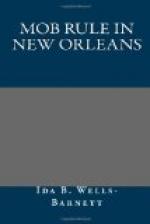in the engine room of the St. Charles Hotel. At
each of the places where he worked he was known
as a quiet, rather surly fellow, who had little
to say to anybody, and generally performed his tasks
in morose silence. He managed to convey the impression,
however, of being a man of more than ordinary intelligence.
A Negro named William Butts, who drives a team on the levee and lives on Washington Street, near Baronne, told a Times-Democrat reporter yesterday that Charles got a job about a year ago as agent for a Liberian Immigration Society, which has headquarters at Birmingham, and was much elated at the prospect of making a living without hard labor.
According to the further investigations of this reporter, Charles was also agent for Bishop Turner’s Voice of Missions, the colored missionary organ of the African Methodist Church, edited by H.M. Turner, of Atlanta, Georgia. Concerning his service as agent for the Voice of Missions, the reporter says:
He secured a number of subscribers and visited them once a month to collect the installments. In order to insure regular payments it was necessary to keep up enthusiasm, which was prone to wane, and Charles consequently became an active and continual preacher of the propaganda of hatred. Whatever may have been his private sentiments at the outset, this constant harping on one string must eventually have had a powerful effect upon his own mind.
Exactly how he received his remuneration is uncertain, but he told several of his friends that he got a “big commission.” Incidentally he solicited subscribers for a Negro paper called the Voice of the Missions, and when he struck a Negro who did not want to go to Africa himself, he begged contributions for the “good of the cause.”
In the course of time Charles developed into a fanatic on the subject of the Negro oppression and neglected business to indulge in wild tirades whenever he could find a listener. He became more anxious to make converts than to obtain subscribers, and the more conservative darkies began to get afraid of him. Meanwhile he got into touch with certain agitators in the North and made himself a distributing agent for their literature, a great deal of which he gave away. Making money was a secondary consideration to “the cause.”
One of the most enthusiastic advocates of the Liberian scheme is the colored Bishop H.M. Turner, of Atlanta. Turner is a man of unusual ability, has been over to Africa personally several times, and has made himself conspicuous by denouncing laws which he claimed discriminated against the blacks. Charles was one of the bishop’s disciples and evidence has been found that seems to indicate they were in correspondence.
This was all that the Times-Democrat’s reporters could find after the most diligent search to prove that Charles was the fiend incarnate which the press of New Orleans and elsewhere declared him to be.




